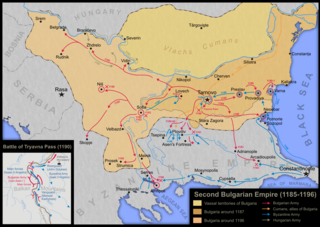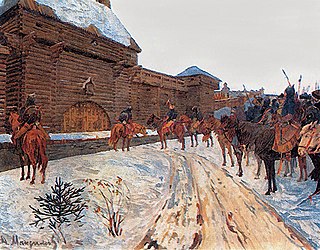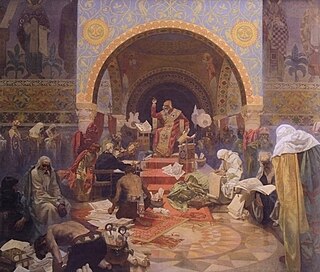
Year 1196 (MCXCVI) was a leap year starting on Monday of the Julian calendar.

Year 1237 (MCCXXXVII) was a common year starting on Thursday of the Julian calendar.

The Mongol Empire invaded and conquered Kievan Rus' in the mid-13th century, destroying numerous cities including the largest such as Kiev and Chernigov. The Mongol siege and sack of Kiev in 1240 is generally held to mark the end of Kievan Rus'. Many other major Rus' principalities and urban centres in the northwest escaped destruction or suffered little to no damage from the Mongol invasion, including the Novgorod Republic, Pskov, Smolensk, Polotsk, Vitebsk, and probably Rostov and Uglich.

A boyar or bolyar was a member of the highest rank of the feudal nobility in many Eastern European states, including Kievan Rus', Bulgaria, Russia, Wallachia and Moldavia, and later Romania, Lithuania and among Baltic Germans. Boyars were second only to the ruling princes from the 10th century to the 17th century. The rank has lived on as a surname in Russia, Finland, Lithuania and Latvia where it is spelled Pajari or Bajārs/-e.

Vladimir-Suzdal, also Vladimir-Suzdalian Rus', formally known as the Grand Duchy of Vladimir (1157–1331), was one of the major principalities that succeeded Kievan Rus' in the late 12th century, centered in Vladimir-on-Klyazma. With time the principality grew into a grand duchy divided into several smaller principalities. After being conquered by the Mongol Empire, the principality became a self-governed state headed by its own nobility. A governorship of principality, however, was prescribed by a jarlig issued from the Golden Horde to a Rurikid sovereign.
Grand prince or great prince is a title of nobility ranked in honour below emperor, equal of king or archduke and above a sovereign prince.

Vsevolod III Yuryevich, or Vsevolod the Big Nest (1154–1212), was Grand Prince of Vladimir from 1176 to 1212. During his long reign, the city reached the zenith of its glory.

Vladislav is a male given name of Slavic origin. Variations include Volodislav, Vlastislav and Vlaslav. In the Czech Republic, Slovakia and Croatia, the common variation is Ladislav.

Nemanjić family tree
The Muscovite–Lithuanian Wars were a series of wars between the Grand Duchy of Lithuania, allied with the Kingdom of Poland, and the Grand Duchy of Moscow, which would later become the Tsardom of Russia. After several defeats at the hands of Ivan III and Vasily III, the Lithuanians were increasingly reliant on Polish aid, which eventually became an important factor in the creation of the Polish–Lithuanian Commonwealth. Before the first series of wars in the 15th century, the Grand Duchy of Lithuania controlled vast stretches of Eastern European land, from Kyiv to Mozhaysk, following the collapse of Kievan Rus' after the Mongol invasions. Over the course of the wars, particularly in the 16th century, the Muscovites expanded their domain westwards, taking control of many principalities.
The Principality of Ryazan, later known as the Grand Duchy of Ryazan, was a principality from 1129 to 1521. Its capital was the city of Ryazan, now known as Old Ryazan, which was destroyed in 1237 during the Mongol invasions. The capital was moved to Pereyaslavl-Ryazansky, later renamed Ryazan.
Ivan is a Slavic male given name, connected with the variant of the Greek name Iōánnēs from Hebrew יוֹחָנָן Yôḥānnān meaning 'God is gracious'. It is associated worldwide with Slavic countries. The earliest person known to bear the name was Tsar Ivan Vladislav of Bulgaria.
Grand Prince Ivan V of Ryazan was the last nominally independent ruler of Ryazan Principality. Ivan V of Ryazan was the only son of Prince Ivan Vasilievich and his wife, Agrippina (Agrafena) Vasilyevna, Princess Babich-Drutskaya.
Grand Princess Anna Vasilievna of Ryazan was a Russian noblewoman, Regent of the Ryazan Principality in 1483 and in 1500–1501, during the minority of her son and grandson. She was the only daughter of Grand Prince Vasily II of Moscow and the mother and grandmother of last Grand Princes of Ryazan Principality. Anna was born in Moscow to the family of Vasily II of Moscow, who was blinded five years before her birth during a time of troubles, and Maria Yaroslavna of Borovsk.

Vasily Ivanovich was the Grand Prince of Ryazan (1456–1483), son of Grand Prince Ivan III of Ryazan.
Anastasia of Russia may refer to:
Ivan Ivanovich may refer to:

Tsar, also spelled czar, tzar, or csar, was a title used by East and South Slavic monarchs. The term is derived from the Latin word caesar, which was intended to mean "emperor" in the European medieval sense of the term—a ruler with the same rank as a Roman emperor, holding it by the approval of another emperor or a supreme ecclesiastical official —but was usually considered by Western Europeans to be equivalent to "king". It lends its name to a system of government, tsarist autocracy or tsarism.
Grand Duke Ivan IV of Ryazan was the ruler of the Grand Duchy of Ryazan (1483–1500). He was the elder son of Grand Duke Vasily Ivanovich of Ryazan and Grand Duchess of Ryazan Anna Vasilyevna, younger sister of Ivan III of Moscow. He had a younger brother, Prince Fyodor Vasilyevich, with whom he shared domains in the Duchy of Ryazan.

Ivan III or Ivan Fyodorovich was the Grand Prince of Ryazan (1427–1456) and younger son of Grand Prince Fyodor II of Ryazan. During his reign, he retained good diplomatic relationships with both the Grand Duchies of Lithuania and Moscow. He signed treaties with both Vytautas of Lithuania and Vasily II of Moscow, and sent his children to the court in Moscow for safety. Towards the end of his life, he took monastic vows and was succeeded by his eight-year-old son, Vasily.










